After four long years, PyCon CZ, the Czech Python community conference, was held on September 15–17, 2023 in Prague. We hope you enjoyed the sessions, made meaningful connections, and enjoyed all the geeky surprises we prepared for you! Scroll down for tl;dr 🙂
Restart of the Community#
At the heart of our conference is the community – PyCon CZ is created by the community, for the community. Due to Covid, we suffered a 4-year-long break so this year it was all about restarting: the community, the event, the momentum, and reigniting the passion that binds us together.
Organiser team#
Our team consisted both of people based in the Czech Republic and abroad so most of our communication was online and asynchronous. Just like at each PyCon CZ since 2015, we are all volunteers who have dedicated several months of spare time to prepare the event.
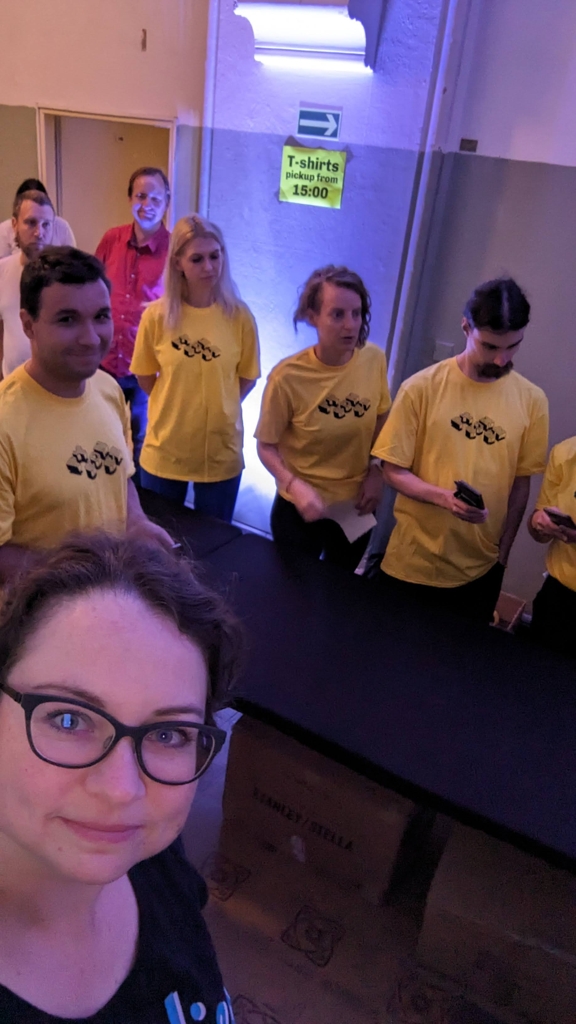
Volunteer team meeting on the first morning
Core team members took on the usual task areas: finding and contracting the venue, AV services, catering, bringing in furniture and equipment (over 1,000 chairs, tables and other items!), writing the call for presentations, preparing the submission system, going through the applications and selecting speakers, creating a balanced programme, taking care of the ticketing system, managing social networks, writing and replying to emails, acquiring sponsors and communicating with them clearly, managing speakers, deciding on financial aid, selecting the best coffee provider, supplying internet at the venue, creating beautiful designs, deciding on t-shirt brand and quality, watching the budget closely, finding MCs and volunteers, keeping an eye on the deadlines and ~~pushing~~ motivating people to finish their tasks on time…
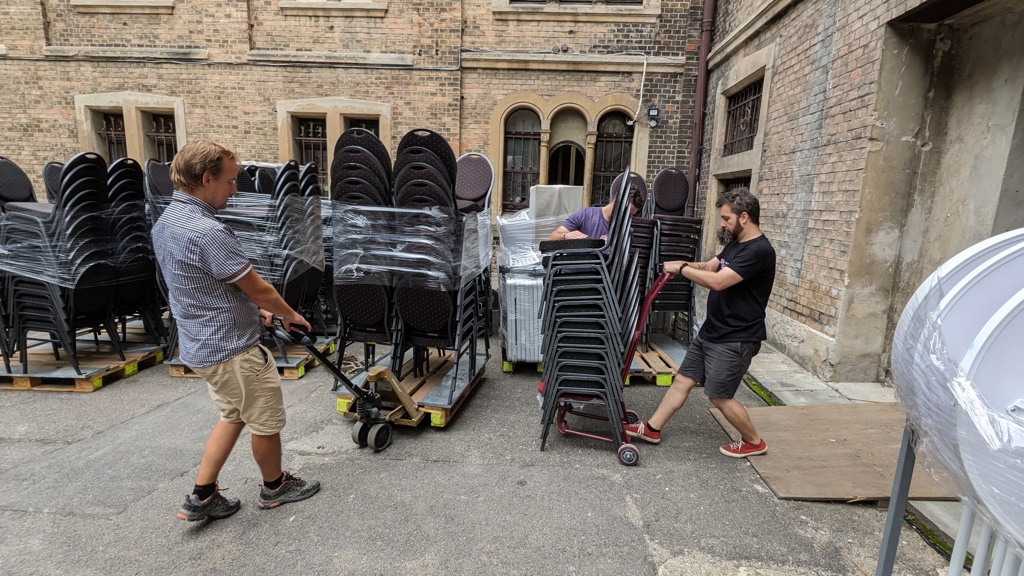
Bringing in the furniture
Results#
Goals#
Since this year's event was supposed to be a comeback after the pause, our goal was to make the conference the biggest PyCon CZ ever. That is, attract more attendees and offer more content than in previous years. Therefore, we aimed at running at least 3 tracks of talks and welcoming 600 attendees. Another big goal was to attract many beginners and people who have just recently started working in IT.
Content#
The agenda was distributed the same way as in previous years: two days of talks (Friday and Saturday) and one day of workshops (Sunday). This gave us enough space to focus the session tracks on specific topics. One track was focused solely on data, as it is a popular area in Python programming. The second track contained general topics or talks suitable for programmers on any level. The third track offered talks for beginners – and we had so much content for them that the sessions ran in two rooms! Workshops ran in 9 rooms so they offered 240 seats in the morning and 200 in the afternoon, but we still couldn't satisfy everyone interested in joining them. Next time, we will need many more! And it's great to see so many people eager to learn new things. Regarding the agenda, the conference offered:
- 4 keynotes
- 45 talks by 46 speakers and 17 workshops by 27 tutors
- 2 panel discussions with 9 panel members
- a moderated group discussion for juniors
- 2 social events: a board game night on Friday and the afterparty on Saturday
- a lounge with retro games and 3D printers, and an on-site treasure hunt
- speakers' dinner on Thursday (for speakers, organisers, VIP ticket holders and MCs)
Session topics ranged from very broad and general ones to deep dives. When we were selecting the content, we made sure that the topics won't repeat too much in the schedule. Obviously, some topics were more popular this year but we strove to cover a wider range of ideas and experience that the speakers offered to bring.
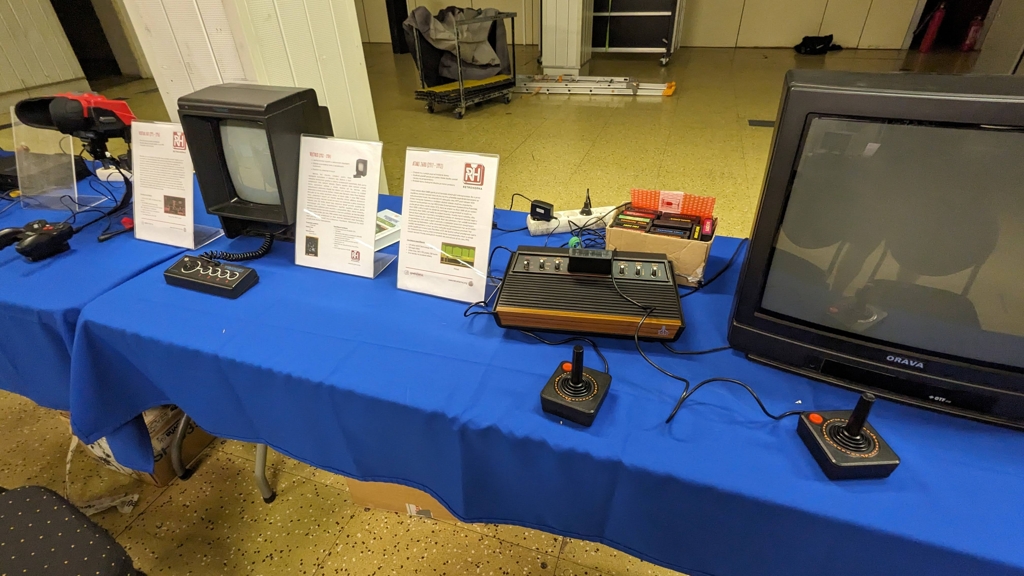
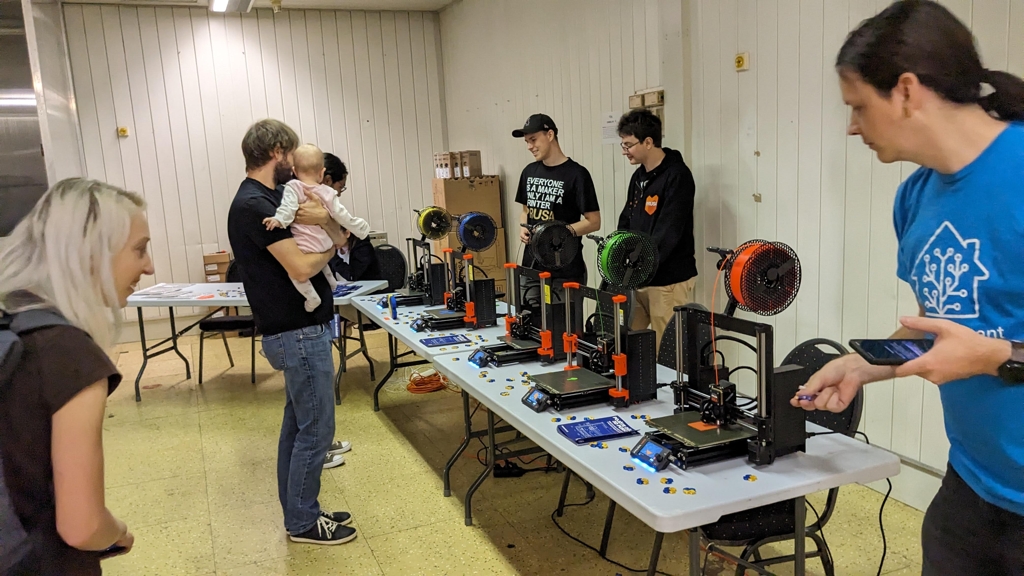
Retro games and 3D printers lounge
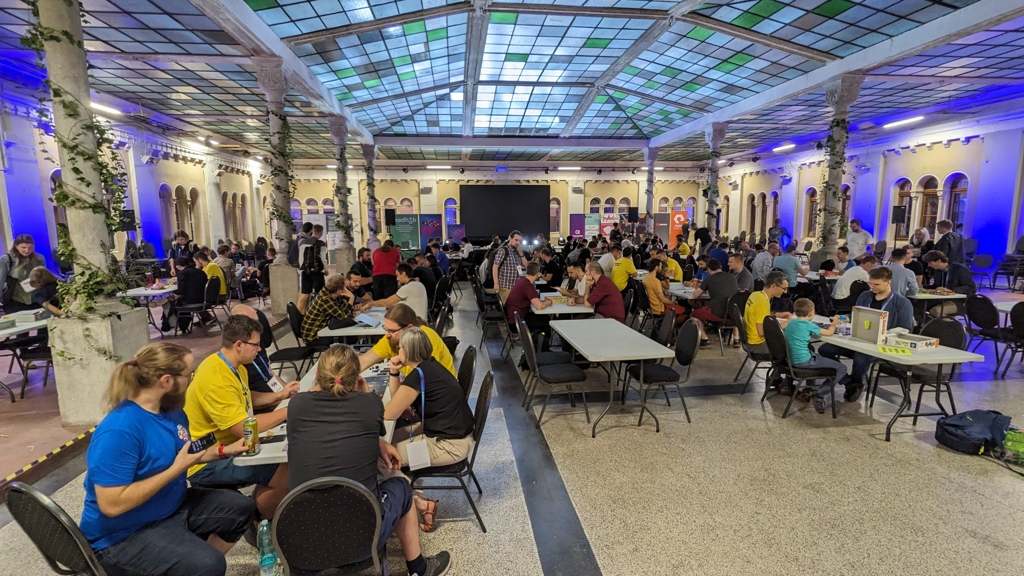
Board game night
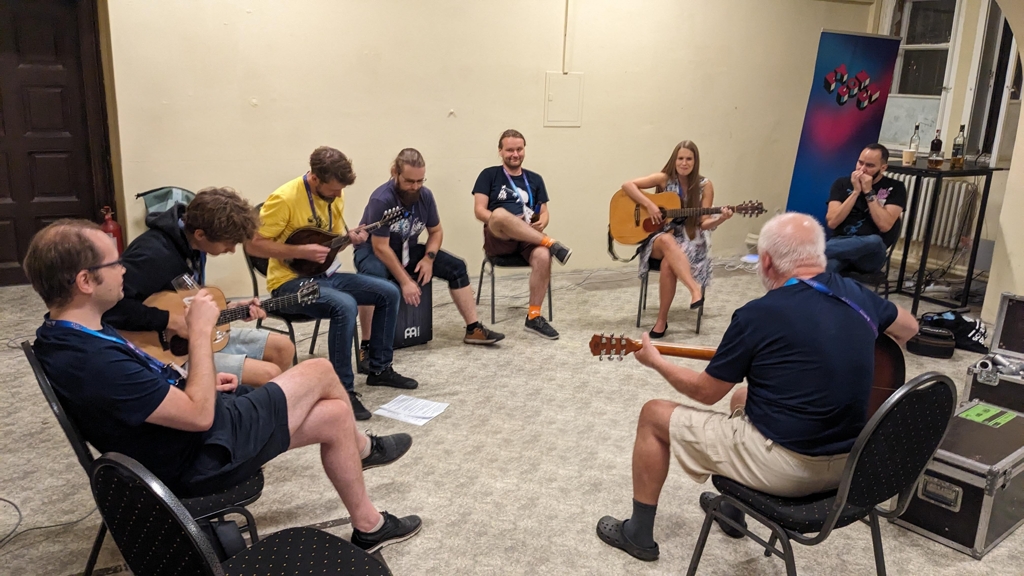
Musical section at the afterparty
Tickets & registrations#
We offered tickets in several tiers. Regardless of the type of the ticket you had, you were able to access the same content and parts of the conference as anyone else. The tiers are there to allow us to create a balanced budget. Educational tickets, the most affordable option, were available to students, teachers, and attendees of PyLadies' courses. Company tickets were more expensive than the Individual tickets, allowing us to maintain a more affordable rate for people paying the ticket out of their own pocket. Out of the 613 registered attendees, 599 (or 97.7%) attendees checked in at the conference. Those who have not arrived were equally split between the ticket tiers (disproving the idea that Company ticket holders are less likely to arrive because they didn't pay the ticket themselves).
Attendee diversity#
During the ticket purchase, attendees were asked several questions about their background. No questions were mandatory but each question was answered by at least two thirds of ticket buyers so the information is relevant. Half (51.7%) attendees came from Prague, 31.3% came from the rest of the Czech Republic and 17% came from abroad. Most foreigners came from Poland (20 people), Germany (15) and Slovakia (10), the remaining 26 people came from Austria, the Netherlands, Hungary, Switzerland, India, Croatia, France, Ireland, USA, Japan, Finland, Spain, Bulgaria, Ukraine and Great Britain. For most attendees (72.4%), this was their first PyCon CZ ever, while 10.6% have been to 3 or more Czech PyCons (remember that this was the 6th edition). Regarding attendees' self-perceived level of skill in Python programming, 15.9% called themselves expert Pythonistas, 43.9% stated they have done some advanced stuff in Python, 29.4% have done a few things here and there, and 10.8% were beginners in Python.
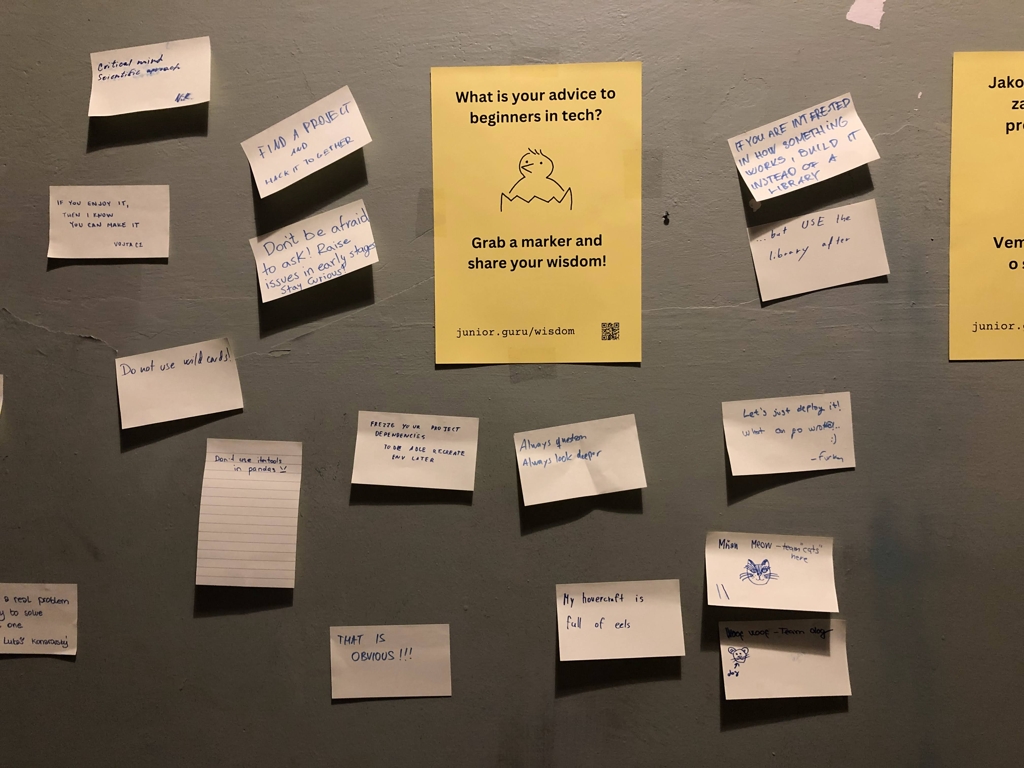
Junior Guru post-its, photo by Honza Javorek
And what did people come to the event for? Most obviously said that they were interested in professional and personal development, collaboration and free and open-source software. However, half attendees were also interested in ML/AI and data-related topics. About a third wanted to learn more about testing and debugging, web development, security, and system administration / DevOps / SRE. Since we strove to keep the ticket registration form as short as possible, we only know about gender diversity from two sources:
- calculated from ticket registration names (25% were female names) and
- feedback respondents (19% of attendees and 28% of speakers were female, and 1% of attendees and 1% of speakers were non-binary)
Regarding age, we only collected this data in the feedback form, which had a low response rate of 22%, so the following information might not represent all attendees of the conference. According to the feedback form, 35% of attendees were under 29 and 51% were in the 30–39 group.
Financial Aid#
PyCon CZ 23 offered to support people who would not otherwise be able to come to the event. This year, the financial aid was allocated as follows:
- Attendees: 12k CZK
- Speakers: 41k CZK
For supported attendees, it means that we gave them a free ticket (9 times) and reimbursed their travel or accommodation costs (8 times). Speakers always receive a free ticket and usually their employers pay for the travel costs, but sometimes it wasn't the case and we were ready to cover such expenses (5 times).
Venue & accessibility#
This year we took extra care about accessibility issues because the venue was extremely tricky from this point of view – it is an old monastery, after all. For instance, the main entrance comprised a steep hill and two flights of stairs. Although there was an elevator in the building, the upstairs room was not exactly on the same level as the first floor so we had to set up a ramp on one flight of stairs. The toilets on the ground floor were renovated, but still not big enough for a wheelchair to fit in, so we ordered a special portapotty which was set up in the backyard. In the end, there was only one attendee with a wheelchair, but luckily they could use crutches to use the toilet.
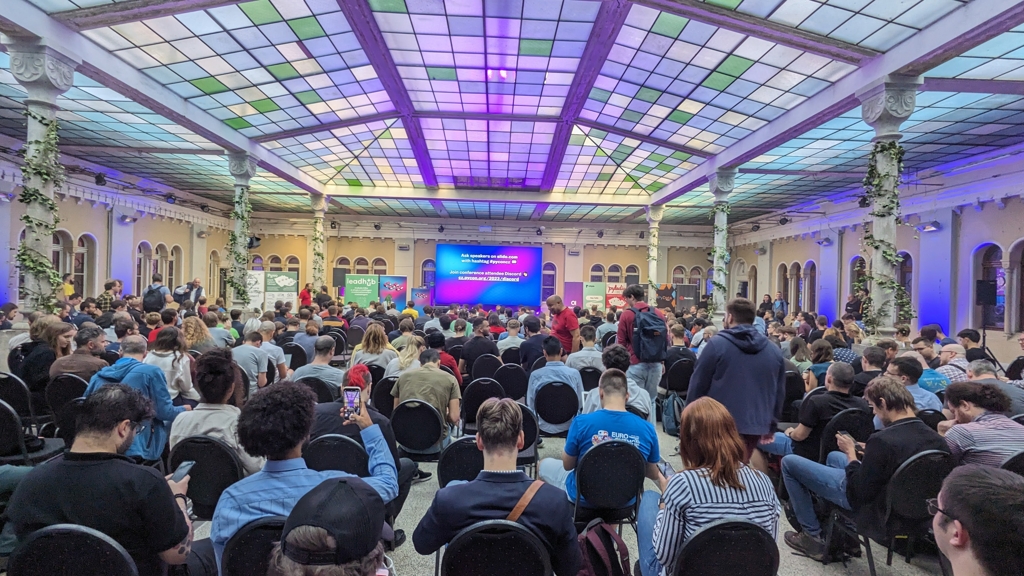
This was the Main room, the biggest one, seating over 300 people
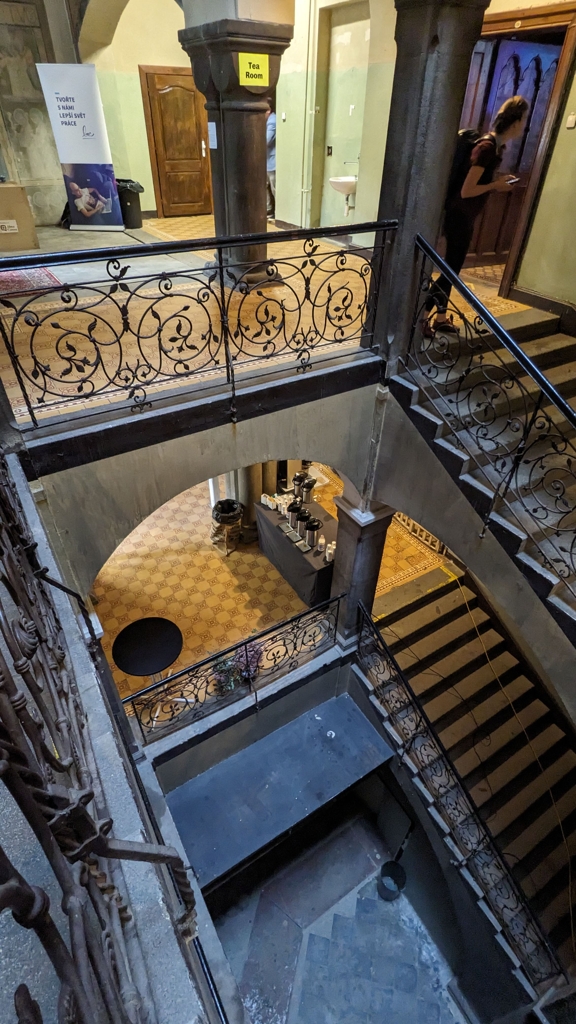
If you kept switching the session tracks, you could get a pretty nice stair workout
One attendee informed us beforehand that they needed a quiet room (a sensory-neutral room) and to sit near the speakers, as they are hearing impaired. Therefore, we designated several of the tiny upstairs rooms in the further part of the building as “quiet rooms” and placed one chair or deck chair and a blanket in each of them. We also used one of the bigger rooms upstairs near the second coffee stand as a “chill room” with more places to sit and relax. We were happy to see that both types of rooms were well used and we believe this is a great example of making the conference a pleasant experience for everyone.
As far as we know, there were no other attendees with special needs – we asked about this in the ticket registration process.
We were lucky that the weather was really nice so people could chill out in the backyard.
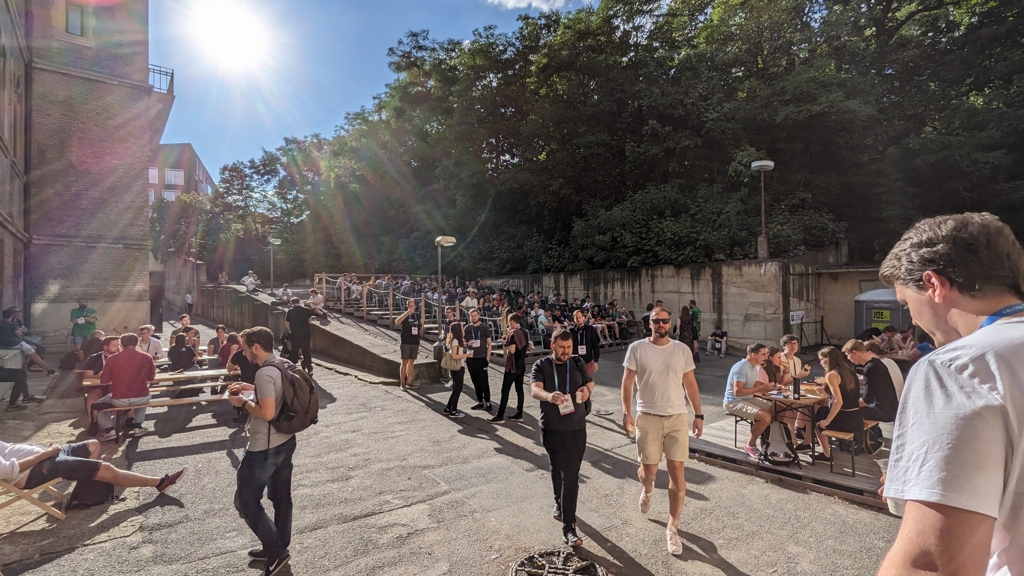
People enjoying the warm and sunny weather
Languages#
The official language of the event is English (17% of attendees and 38% of speakers arrived from abroad), but as we offered a significant part of the programme to beginners who were mostly Czech-speaking, we allowed speakers to present in Czech if they did not feel like speaking English. Sessions in Czech were:
- 13 talks (out of 51),
- both panels and
- 5 workshops (out of 17).
All keynotes were in English.
Childcare#
This edition was also special thanks to an extended provision of childcare. For parents (who could register their children while purchasing the tickets), we provided professional childcare services during the whole event, including Sunday's workshops. We contracted the same company that EuroPython used in July 2023 because they were happy with the quality. Just as well, we received great feedback and consider the cost to be well-spent money. Along with the retro games lounge, this was a great way to allow parents to take part in the conference and not worry about babysitting.
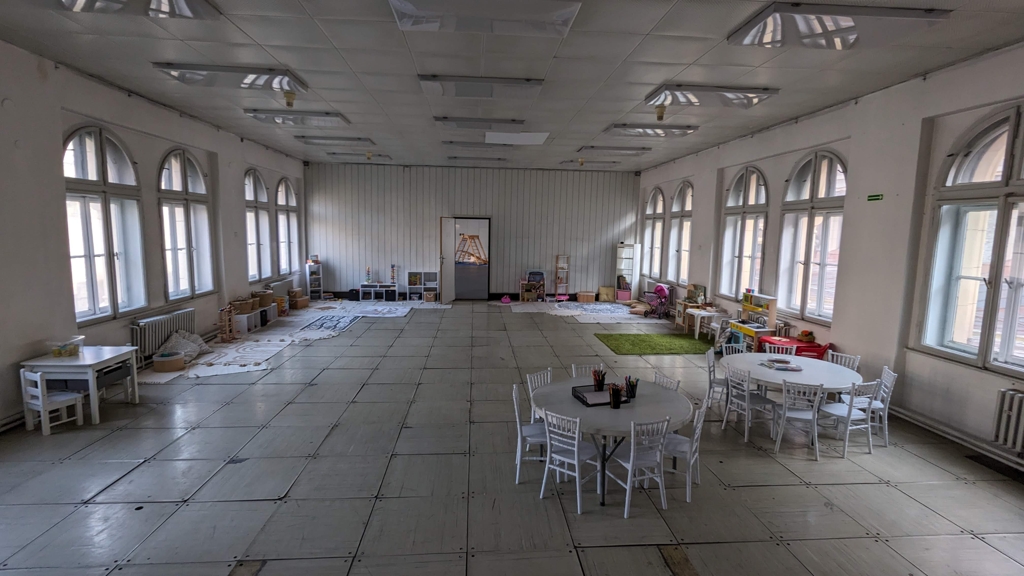
Childcare rooms were really big!
Code of Conduct Report#
Our Code of Conduct is adapted from the Conference anti-harassment policy found on the Geek Feminism Wiki page, tailored specifically for our event. Agreeing to this Code was compulsory when purchasing a ticket. Two contact persons, one male and one female, were designated as points of contact for the Code of Conduct. Attendees were reminded of the Code several times during the event. A short version and contact information was printed on attendee badges.
We are pleased to report that there were no Code of Conduct violations reported during the event.
Feedback#
Disclaimer: we did not manage to send the feedback form soon enough after the event, so we only received 130 responses, which is a 22% response rate.
Most popular sessions#
We asked people to give us feedback on the conference programme.
In general, 35% of attendees were very satisfied with the overall content of the conference, and 47% were quite satisfied. Only 5 people said they were not satisfied and only two of those added further comments. One complained about too many AI-focused sessions.
The questionnaire also asked the respondents to rate individual sessions. This was done on a lexical scale (Excellent, Good, Not great, not terrible, and Not good). We recalculated the ratings into a numeric scale of 4 to 1, 4 being Excellent, i.e., the higher the number, the better the rating. Only sessions with enough ratings were considered.
Five best rated talks were:
- talk by P. Šimeček: Velké jazykové modely: naučte ChatGPT básnit a zkroťte si svou lamu (3.81)
- talk by M. Brabenec: Tam a zase zpátky aneb cesta HTTP požadavku (3.78)
- panel discussion Mýty a stereotypy o IT by M. Bajić, H. Javorek, L. Tvrdíková, Š. Melicharová, R. Hraška (3.73)
- keynote by E. Gabašová: Transformational Power of Openness: Reflections on Open Science and Open Source (3.64)
- keynote by K. Minařík: The Library and the Maze (3.64)
Best rated workshops were delivered by D. Seager: Effective Communication (3.60) and D. R. Raneland: Test Driven Development For Everyone (3.00).
Opinions on the programme#
Several respondents complained that the agenda contained too many talks about ML/AI (even though half of attendees stated they were interested in it while purchasing their tickets). We still think it's a modern technology that many people work with, so we consider this to be a case of “you can't cater to everyone's taste”.
While several people complained that the talks did not go deep enough, there were others who praised the entry-level talks. This feedback is expected because our audience was very diverse regarding their programming skills, and we really focused on beginner content this year. PyCon CZ is not only about the programme but also about the community spirit and networking opportunities.
Nevermind the criticisms, 83% stated that they would likely or definitely attend again next time!
Fuckup#
The AV company let us down when they forgot to record speakers' screens. Therefore, they had to merge recordings of speakers with the slides manually, which resulted in low quality videos. Moreover, some talks were not recorded at all by mistake. In the end, there are videos of only about half of all presentations. We demanded and received a discount on AV services, but it is irreparable nevertheless. This is a huge learning for us that we must often check the quality of suppliers' services during the event, not solely rely on their word.
Photos#
Find official photos in these albums:
- Friday: https://photos.app.goo.gl/NrAZCSETfs3FyiAH8
- Saturday: https://photos.app.goo.gl/EYXc2idtaTJ5YtL17
- Sunday: https://photos.app.goo.gl/LrftL1CEijHGbcQ87
Budget#
PyCon CZ budget, just like any other event budget, strives to end up in black numbers, that is, with expenses lower than the income. The income comprises two sources: money made by selling tickets and funds raised from sponsors. When the event organising team starts working, they have to estimate the expenses based on the expected income. This year, we knew that we might struggle to partner with enough sponsors due to the complicated economic situation on the market. On the other hand, we definitely did not want to raise the ticket prices to amounts that many people wouldn't be able to pay.
We had numbers from the past that we could base our financial estimates on, but we also wanted to make some changes in what the event looks like compared to previous Prague conferences. For example, we wanted to provide attendees with warm lunches, which is way more expensive than serving just sandwiches and salads because you have to pay for the staff and culinary equipment, while prices of foods have gone up as well. So, while we paid CZK 184,000 in 2018 for 400 people, we spent CZK 700,000 this year for 600 people. We needed a bigger venue where the AV services were more expensive. We wanted to have a bigger Retro games lounge. We needed more coffee stands…
Luckily, we were able to connect with many partners who supported us financially, and received 2 grants from Python NGOs (EuroPython Society and Python Software Foundation). We are grateful to everyone who joined in to help us make PyCon CZ 23 reality!
Below, you can find detailed income and expense items; all amounts are in thousand CZK.
Income#
Total income was 2,271, of which:
- Tickets: 1,066
- T-shirts: 42
- Sponsors: 709
- Grants: 454
& there was some available amount from previous conferences: 223
Expenses#
Total expenses were 2,430, of which:
- Main venue rent: 169
- Furniture rent: 129
- Childcare: 45
- AV services: 445
- Catering (breakfast, lunch, coffee break): 719
- Coffee: 185
- Afterparty drinks: 60
- Speakers' dinner: 68
- T-shirts: 83
- Volunteers' t-shirts: 10
- All other prints: 55
- Web design: 46
- Retro games: 20
- Ticketing system and paygate fees: 53
- Speaker submission system fee: 14
- Cleaning services, waste disposal, portapotty: 29
- Internet: 5
- Financial aid for speakers: 41
- Financial aid for attendees: 12
- Refreshments for volunteers: 7
- Volunteer reimbursements (travel and accommodation): 14
- Other purchases, fees and payments: 20
- Bára's (main organiser) reward: 126
- Dan's reward: 75
Therefore, the budget is finalised at plus CZK 64,000. This is not a huge amount but considering the current economic and social situation, we believe this is not a terrible result – our financial goal was to end up in black numbers.
tl;dr & outro#
PyCon CZ 23 has been the biggest PyCon CZ yet, and we ended up with a balanced financial result. We implemented an extended beginners track which brought many new people into the community. We provided extensive childcare and took extra care to make the venue welcoming, e.g. designated quiet rooms or a portable toilet for people on wheelchairs. Attendees and speakers arrived from both the Czech Republic and foreign countries. Reading through their feedback and talking to attendees in person during the event, I have to say that most people enjoyed the conference, its programme and the atmosphere despite some unpleasant moments on the first day.
I know that we – the organising team – have learned a lot during the short time we had to prepare the event and during the event itself. I would love to thank each and every member of the team again: you are invaluable for the Czech Python community!
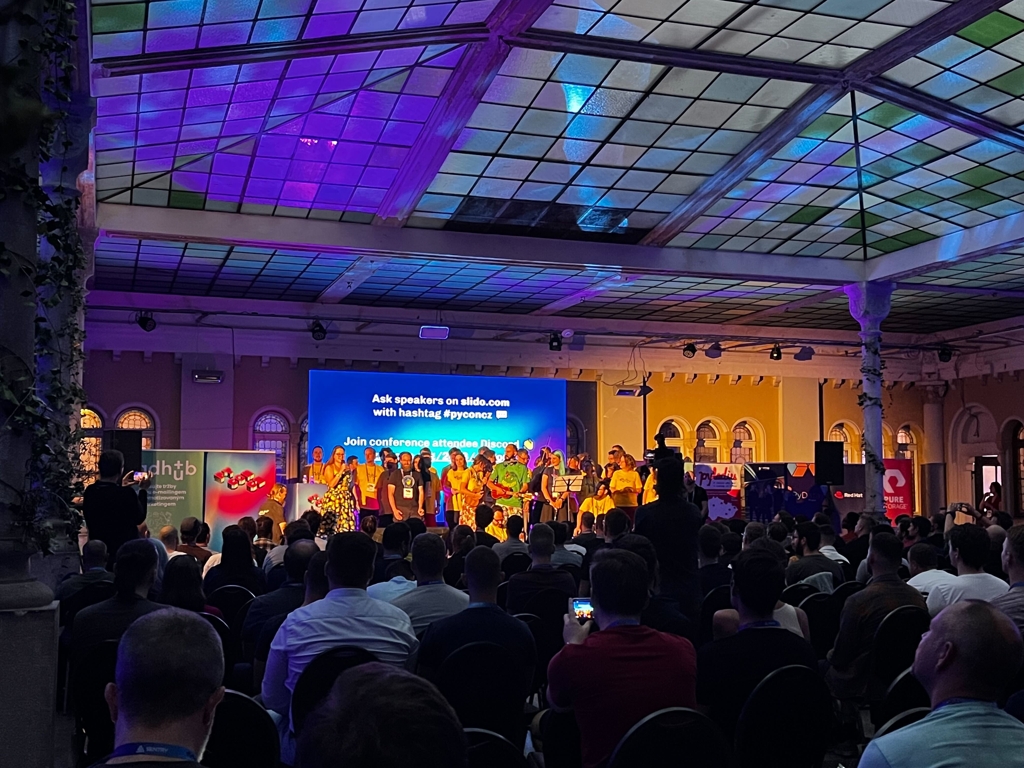
The final speech and giving thanks to the organisers and volunteers was an emotional moment
2024?#
What's next? Who knows! We have not formed a new organiser team, specifically, there is no main organiser ready to take on the challenge yet (as of June 2024). Should you wish to join our team, feel free to drop us a line at info@pycon.cz. And before we begin to prepare the next PyCon CZ, consider exploring and contributing to other community initiatives like PyLadies, Pyvo, PyData, and more!
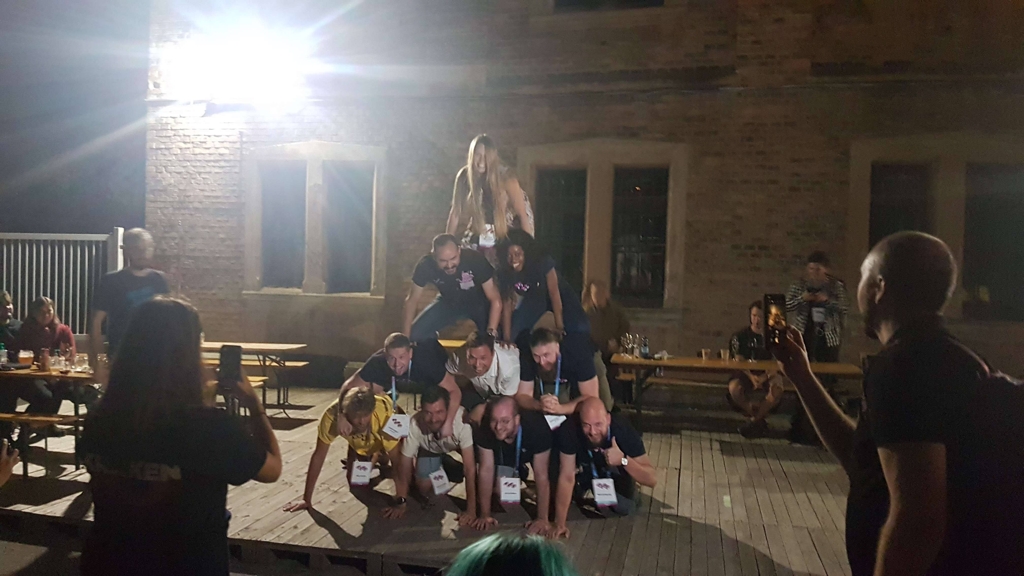
Building a human pyramid is a tradition, photo by Honza Javorek
Photos in this blogpost were taken by Bára Drbohlavová unless stated otherwise